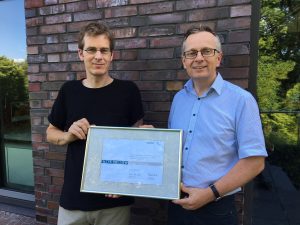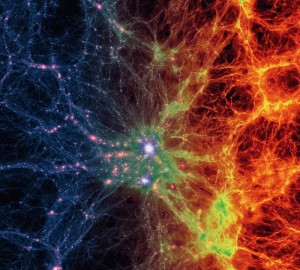An Honor and a Farewell

Volker Springel, head of the Theoretical Astrophysics group at HITS, has assumed his new role as Director of the Max Planck Institute for Astrophysics (MPA) in Garching. As part of his farewell ceremony, he was made an honorary “HITS Fellow.”
After more than eight years, Prof. Volker Springel, head of the research group “Theoretical Astrophysics,” has left HITS and Heidelberg University. Today, he assumes his new position as Director of the Max Planck Institute for Astrophysics in Garching. Springel had already been appointed Max Planck Director last year but continued to work at HITS and Heidelberg University until the end of July 2018. Together with his research group at HITS and partners from Heidelberg, Garching, and the USA, he published new findings on the formation and evolution of galaxies from the “Illustris TNG” simulation in February.
“The new appointment represents a great achievement for Volker Springel as well as for us as a research institute,” said HITS Scientific Director Prof. Michael Strube at the farewell ceremony. “We are delighted that the concept of our founder, Klaus Tschira, has been realized: to bring brilliant young researchers to the institute, to let them conduct research with the greatest possible freedom, and to give them the opportunity to advance their careers.”
Volker Springel agreed: “Eight years ago, I took the conscious risk of accepting a position at a new and unknown institute, and the risk has truly paid off. My appointment as Max Planck Director is a testament to the success of HITS. If you do research here, you can move on to even bigger and better things in your career.”
Volker Springel designed and implemented the largest and most comprehensive computer simulations of the Universe thus far: the Millennium Simulation 2005, the “Illustris” Simulation 2014, and the “Illustris TNG” Simulation 2018. He served as leader of the research group “Theoretical Astrophysics” at HITS from March 2010 while simultaneously working as Professor of Theoretical Astrophysics at Heidelberg University. At HITS, among many other things, Springel refined the “Arepo” code that he had developed, thereby making it possible to simulate the diverse shapes and sizes of galaxies with supercomputers. To date, the code has been used or cited in more than 750 publications. Springel received an ERC Starting Grant in 2012 and has been a “Highly Cited Researcher” since 2014. He became a member of the National Academy of Sciences Leopoldina in 2017.

In recognition of his “exceptional scientific achievements and his service to the institute during his time at HITS,” Volker Springel was made an honorary “HITS Fellow” – the institute’s highest honor – in a ceremony on 23 July. “I will always remain connected to HITS,” Springel stressed, “and do my best to further support the institute. I am sure that it will continue to be successful.” Together with Heidelberg University, HITS will soon appoint a new scientist from the field of “Theoretical Astrophysics.”
Media Contact:
Dr. Peter Saueressig
Heidelberg Institute for Theoretical Studies (HITS)
Phone. +49-6221- 533 245
Email: peter saueressig@h-its.org
www.h-its.org
Twitter: @HITStudies
In this video, Volker Springel talks about work and life at HITS: How he came to the institute, when he met HITS founder Klaus Tschira for the first time, and what makes HITS special compared to other research institutes: https://youtu.be/eeEFENlK9uQ
About HITS
HITS, the Heidelberg Institute for Theoretical Studies, was established in 2010 by physicist and SAP co-founder Klaus Tschira (1940-2015) and the Klaus Tschira Foundation as a private, non-profit research institute. HITS conducts basic research in the natural, mathematical, and computer sciences. Major research directions include complex simulations across scales, making sense of data, and enabling science via computational research. Application areas range from molecular biology to astrophysics. An essential characteristic of the Institute is interdisciplinarity, implemented in numerous cross-group and cross-disciplinary projects. The base funding of HITS is provided by the Klaus Tschira Foundation.